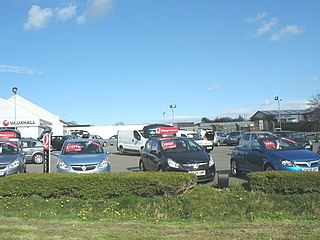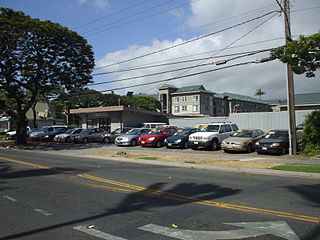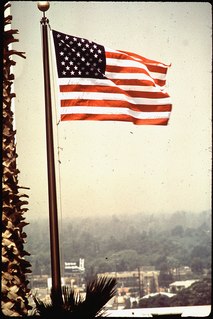Related Research Articles

"The Market for Lemons: Quality Uncertainty and the Market Mechanism" is a well-known 1970 paper by economist George Akerlof which examines how the quality of goods traded in a market can degrade in the presence of information asymmetry between buyers and sellers, leaving only "lemons" behind. In American slang, a lemon is a car that is found to be defective after it has been bought.
CARFAX, Inc. is a commercial web-based service that supplies vehicle history reports to individuals and businesses on used cars and light trucks for the American and Canadian consumers.
In the United States, vehicle registration plates, known as license plates, are issued by a department of motor vehicles, an agency of the state or territorial government, or in the case of the District of Columbia, the district government. Some Native American tribes also issue plates. The U.S. federal government issues plates only for its own vehicle fleet and for vehicles owned by foreign diplomats. Until the 1980s, diplomatic plates were issued by the state in which the consulate or embassy was located.
In US-English, a lemon is a vehicle that turns out to have several manufacturing defects affecting its safety, value or utility. Any vehicle with such severe issues may be termed a lemon, and by extension, so may any product with flaws too great or severe to serve its purpose.
Lemon laws are United States state laws that provide a remedy for purchasers of cars and other consumer goods in order to compensate for products that repeatedly fail to meet standards of quality and performance. Although many types of products can be defective, the term "lemon" is mostly used to describe defective motor vehicles, such as cars, trucks, and motorcycles.

The Center for Auto Safety is a Washington, D.C.-based 501(c)(3) consumer advocacy non-profit group focused on the United States automotive industry. Founded in 1970 by Consumers Union and Ralph Nader, the group focuses its efforts on enacting reform though public advocacy and pressuring the National Highway Traffic Safety Administration and automakers through litigation. For decades, it was led by Executive Director Clarence Ditlow, who died in late 2016 from cancer. Ditlow was widely admired in the auto safety community, although he also had detractors among auto manufacturers. The Center for Auto Safety is currently led by Executive Director Jason Levine.

Vehicle title branding is the use of a permanent designation on a vehicle's title, registration or permit documents to indicate that a vehicle has been written off due to collision, fire or flood damage or has been sold for scrap.

A used car, a pre-owned vehicle, or a secondhand car, is a vehicle that has previously had one or more retail owners. Used cars are sold through a variety of outlets, including franchise and independent car dealers, rental car companies, buy here pay here dealerships, leasing offices, auctions, and private party sales. Some car retailers offer "no-haggle prices," "certified" used cars, and extended service plans or warranties.

The Consumer Federation of California (CFC) was founded in 1960 as a nonprofit consumer advocacy organization. CFC campaigns for state and federal laws and appears at the California state legislature in support of consumer-focused regulations. The Consumer Federation of California is led by Executive Director Richard Holober and President Lucinda Sikes.
In North America, a salvage title is a form of vehicle title branding, which notes that the vehicle has been damaged and/or deemed a total loss by an insurance company that paid a claim on it. The criteria for determining when a salvage title is issued differ considerably by each state, province or territory. In a minority of states and Canadian provinces, regulations require a salvage title for stolen or vandalized vehicles which are not recovered by police within 21 days. In such cases insurance companies declare a vehicle total loss and pay off the previous owner; but, in others, it is issued only for losses due to damage. Under some circumstances, a salvage title denotation may be removed or replaced with a Rebuilt Salvage designation; and cars imported to, or exported from, the United States may be issued a clean title regardless of history.

Auto auctions are a method of selling vehicles based on an auction system. Auto auctions can be found in most countries and are usually exclusive to licensed automobile dealers. In a few countries, such as Japan, auto auctions are well known and used by most residents.

The U.S. state of California first required its residents to register their motor vehicles in 1905. Registrants provided their own license plates for display until 1914, when the state began to issue plates. Plates are currently issued by the California Department of Motor Vehicles.
The Motor Vehicle Owners' Right to Repair Act, sometimes also referred to as Right to Repair, is a name for several related proposed bills in the United States Congress and several state legislatures which would require automobile manufacturers to provide the same information to independent repair shops as they do for dealer shops.

The Car Allowance Rebate System (CARS), colloquially known as "cash for clunkers", was a $3 billion U.S. federal scrappage program intended to provide economic incentives to U.S. residents to purchase a new, more fuel-efficient vehicle when trading in a less fuel-efficient vehicle. The program was promoted as a post-recession stimulus program to boost auto sales while putting more fuel-efficient vehicles on the roadways.

The Tyre Label is a mark for motor vehicle tyres. Manufacturers of tyres for cars, light and heavy trucks must specify fuel consumption, wet grip and noise classification of every tyre sold in EU market starting in November 2012.

The California Smog Check Program requires vehicles that were manufactured in 1976 or later to participate in the biennial smog check program in participating counties. The program's stated aim is to reduce air pollution from vehicles by ensuring that cars with excessive emissions are repaired in accordance with federal and state guidelines. With some exceptions, gasoline-powered vehicles, hybrid vehicles, and alternative-fuel vehicles that are eight model-years old or newer are not required to participate; instead, these vehicles pay a smog abatement fee for the first 8 years in place of being required to pass a smog check. The eight-year exception does not apply to nonresident vehicles being registered in California for the first time, diesel vehicles 1998 model or newer and weighing 14,000 lbs or less, or specially constructed vehicles 1976 and newer. The program is a joint effort between the California Air Resources Board, the California Bureau of Automotive Repair, and the California Department of Motor Vehicles.

Copart, Inc. or simply Copart is a global provider of online vehicle auction and remarketing services to automotive resellers such as insurance, rental car, fleet and finance companies in 11 countries: the US, Canada, the UK, Germany, Ireland, Brazil, Spain, Dubai, Bahrain, Oman and Finland. Headquartered in Dallas, Texas, Copart has over 200 physical locations around the world, where it houses more than 8,000 acres of vehicle inventory. Copart sells used, wholesale and salvage vehicles in weekly and bi-weekly online auctions to buyers ranging from consumers to automotive businesses around the world. Copart provides vehicle sellers with a range of services to process and sell salvage and clean title vehicles over the internet, using its patented virtual auction technology.

Patricia Carmody "Pat" Bates is an American Republican politician currently serving in the California State Senate, representing the 36th Senate district, which encompasses parts of Orange and San Diego counties. She served as the Senate's minority leader from 2017 to 2019. She previously served as a member of the Orange County Board of Supervisors from 2007 to 2014, and the California State Assembly from 1998 to 2004. She also served as the first mayor of Laguna Niguel, California following its incorporation in 1989, and continued to serve on the city council until 1998. Before serving as mayor, she had been employed as a social worker in Los Angeles County.

The stock of plug-in electric vehicles in California is the largest in the United States, with cumulative sales of almost 835,000 plug-in cars by the end of 2020. California is the largest U.S. car market with about 10% of all new car sales in the country, but has accounted for almost half of all plug-in cars sold in the American market since 2011. Since November 2016, China is the only country market that exceeds California in terms of cumulative plug-in electric car sales.
Tesla, Inc. has faced dealership disputes in several U.S. states as a result of local laws. In the United States, direct manufacturer auto sales are prohibited in many states by franchise laws requiring that new cars be sold only by independent dealers. The electric car manufacturer Tesla maintains that to properly explain to their customers the advantages their cars have over traditional vehicles with an internal combustion engine, they cannot rely on third-party dealerships to handle their sales.
References
- ↑ Blumenfield, Robert. "California AB 1215". California Assembly Bill. California Legislature. Retrieved 27 March 2013.
- ↑ "New Law Puts Warning Stickers on Lemons, But Leaves Some Seeing Red". Rosner, Barry & Babbitt. Archived from the original on 25 April 2012. Retrieved 27 March 2013.
- ↑ Jones, Aaron (27 March 2013). "AB 1215 Is Signed Into Law". Canyon News. Archived from the original on 2 November 2011. Retrieved 21 October 2011.
- ↑ Jensen, Christopher (28 September 2011). "In California, a New Lemon Law to Protect Used-Car Shoppers". The New York Times. Retrieved 27 March 2013.